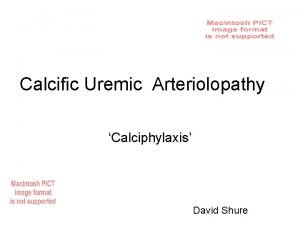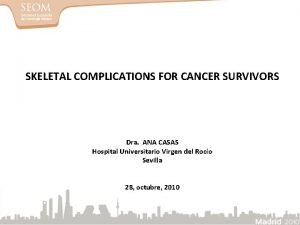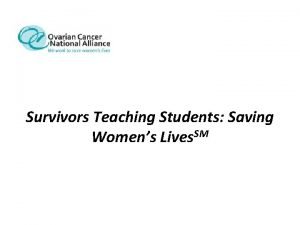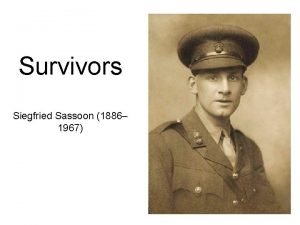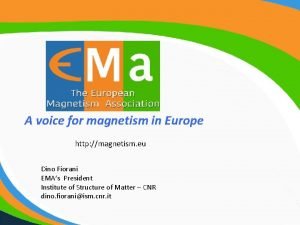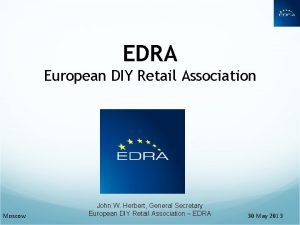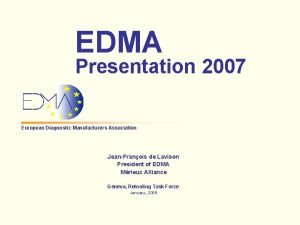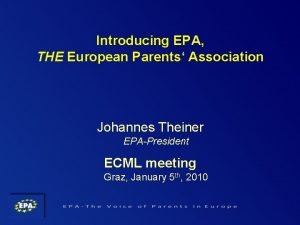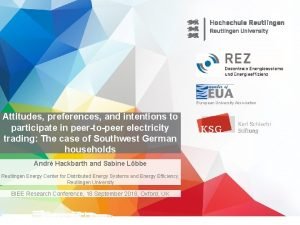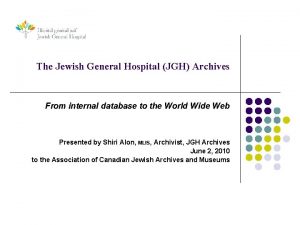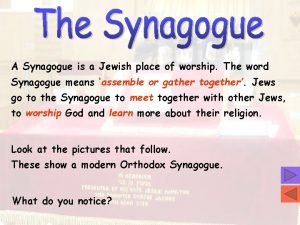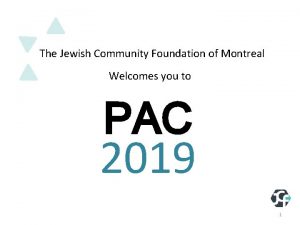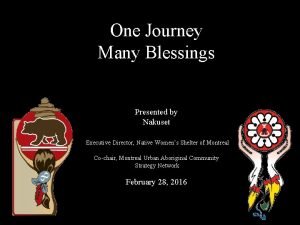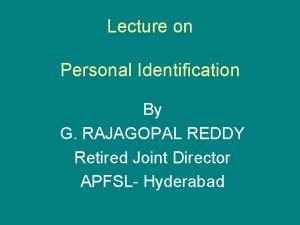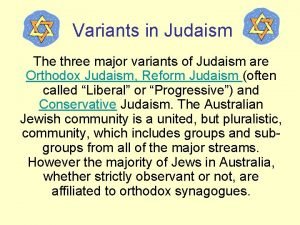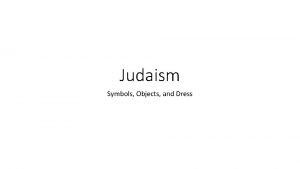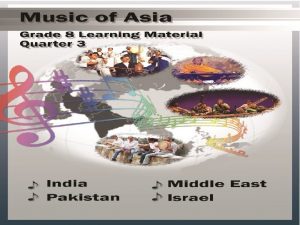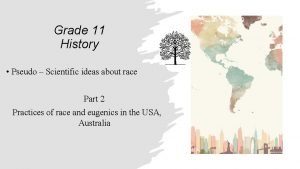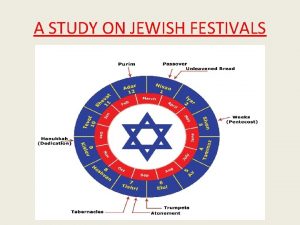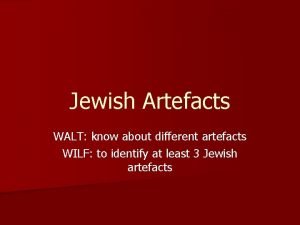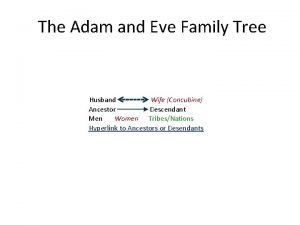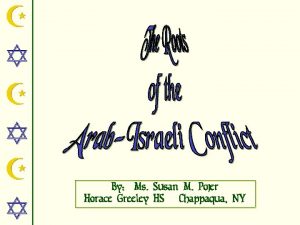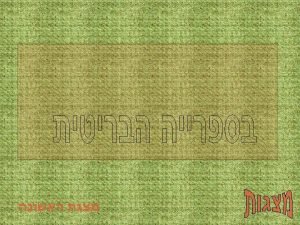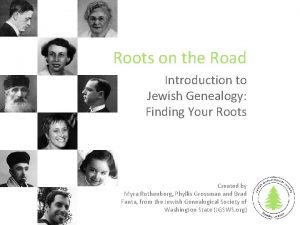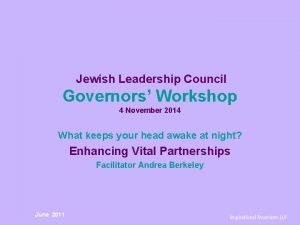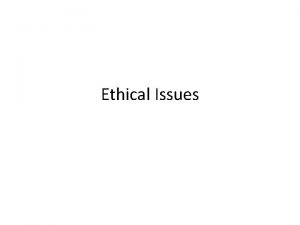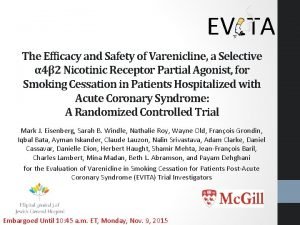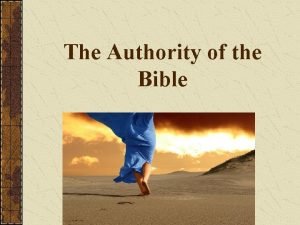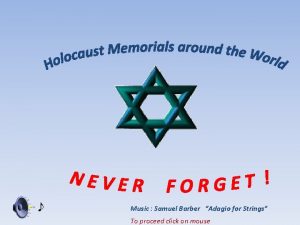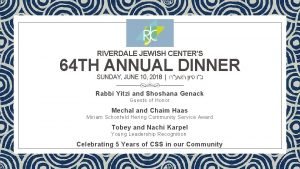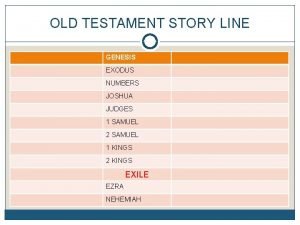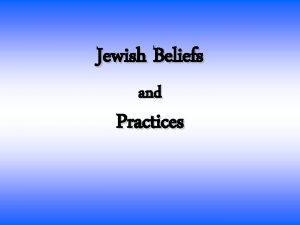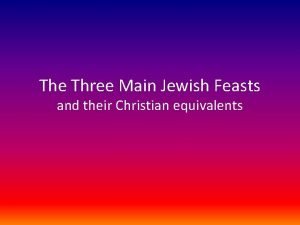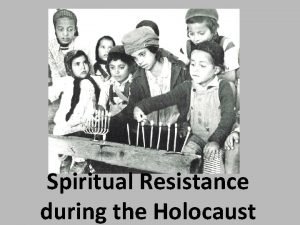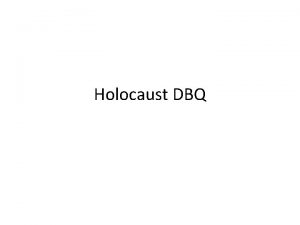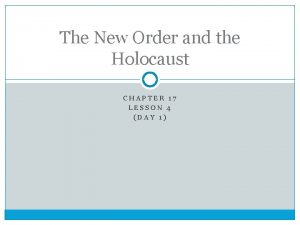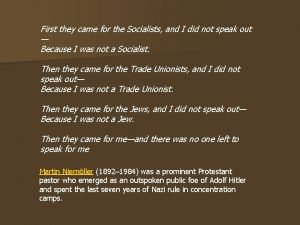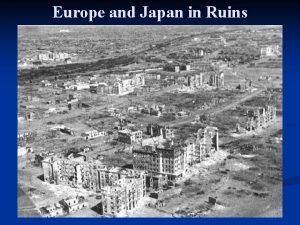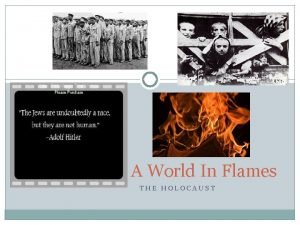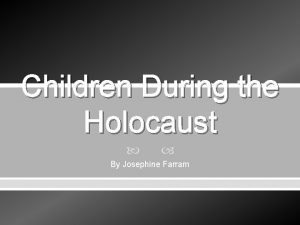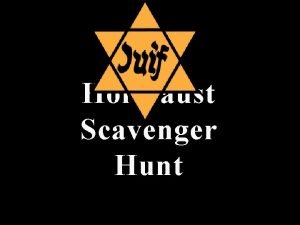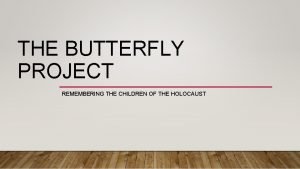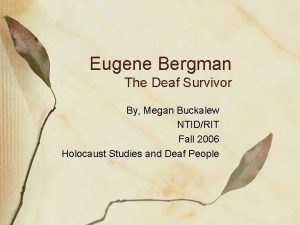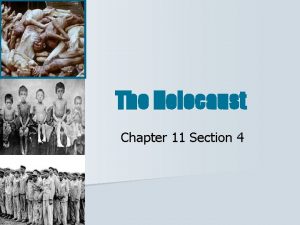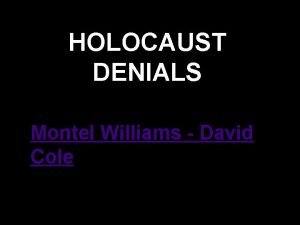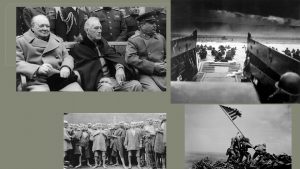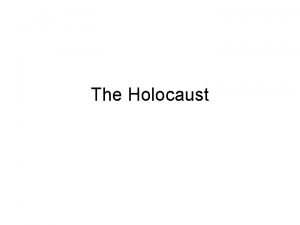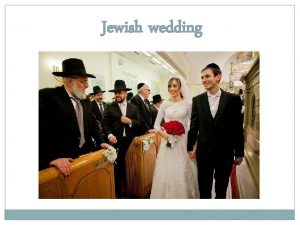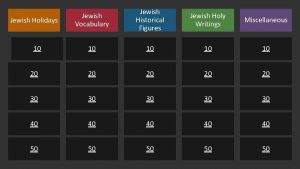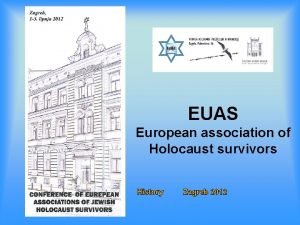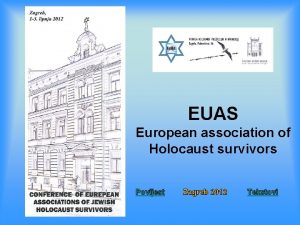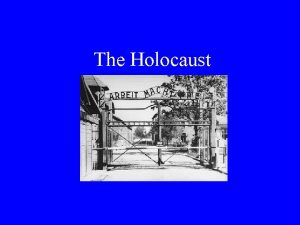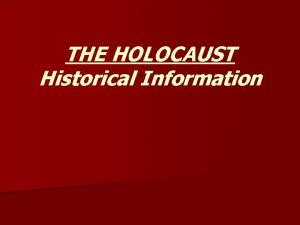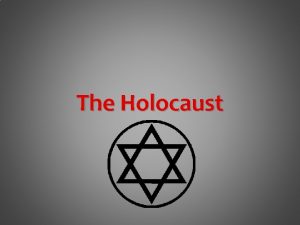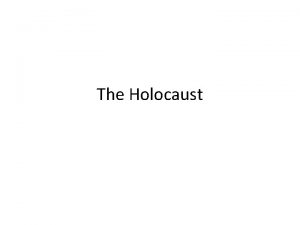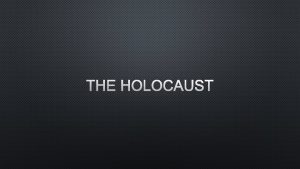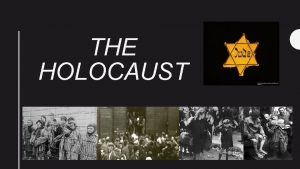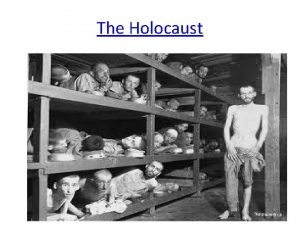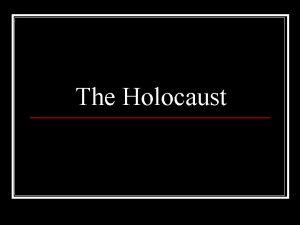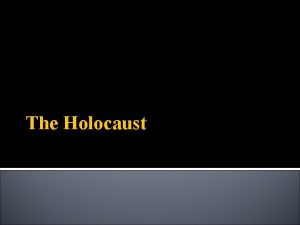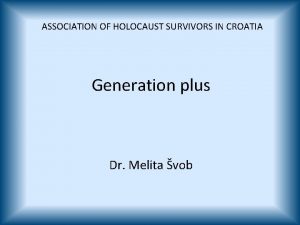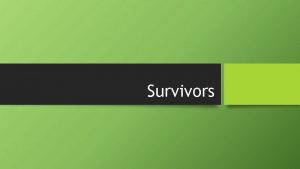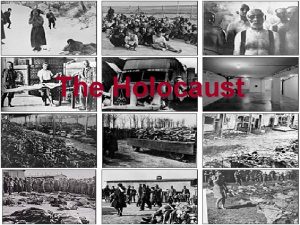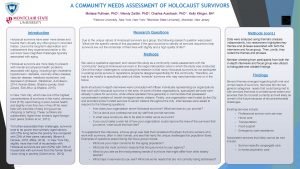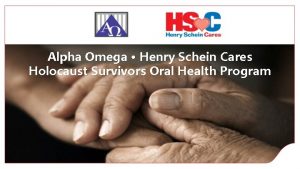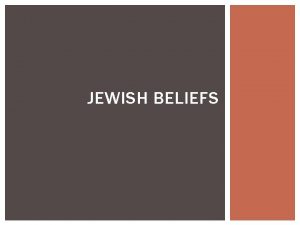EUropean Association of Jewish Survivors of the Holocaust





























































- Slides: 61

EUropean Association of Jewish Survivors of the Holocaust & Descendants Member countries Bosnia and Herzegovina, Croatia, Czech Republic, Italia, Germany, Great Britain, Montenegro, Poland, Russia, Serbia, Slowakia, Sweden, The Netherlands, Ukraine Affiliated countries Austria, Bulgaria, Estonia, France, Greece, Rumania, Israel, Hungary Executive board Max Arpels Lezer, President; The Netherlands, Henri Obstfeld, exec. vice-president; Great Britain, Melita Svob, secretary; Croatia, Sophia Lezer, treasurer; The Netherlands. Members Eugénia Grznáriková, Slowakia, Pavla Rybkova; Czech Republic; Hania Rosenberg, Sweden; Miriam Griver, Israel; Aleksandra Kopistynska, Poland

Jewish Community Zagreb, Palmotićeva 16 Croatia

Šoa akademiju osnovali su Židovska općina Zagreb i Predstavnik židovske nacionalne manjine Grada Zagreba kao logični nastavak programa i projekata koji su se počeli realiizirati 2004. godine. Šoa Akademija je projekt cjelovitog obrazovanja o Holokaustu s ciljem podizanja svijesti o drugim oblicima nasilja i netolerancije te građanskim i ljudskim pravima. Projekt okuplja eminentne stručnjake iz zemlje i inozemstva, a program čine predavanja, prezentacije, filmovi, scenske izvedbe i radionice.











15 th annual conference of the European Association of Jewish Survivors of the Holocaust & Descendants In Zagreb / Croatia, 2016, May 20 -23

The association of Holocaust survivors in Croatia represent Holocaust survivors in Croatia. They are “remnants” of once big Jewish community (25. 000) which was decimated in Holocaust. Association is a member of EUAS and WFJCSHD. Our objectives are to advocate for the interest of the child survivor and their rights, work on improvement of their status and health, to educate about Holocaust and fights anti-Semitism. .

JEWISH (RELIGIOUS) POPULATION IN CROATIA The project „Jewish (religious) population in Croatia” review available data in 12 censuses from 1880 to 2011 in which Jews have been registered with two possibilities: by nationality and by religion. Special attention was given to the census data after World War II, in which question about religion was not asked or was not further elaborated. JEWS IN CROATIA BETWEEN TWO WORLD WARS (1921 -1931) Jews were recorded in 1921 and 1931 censuses only according religion. There was new territorial and political division in new country SHS (Kingdom of the Serbs, Croats and Slovenes), later Yugoslavia. New rules and new law on „Jewish religious communities” was proclaimed in 1929. Jewish population is concentrated in towns. On the country periphery, population of Jews diminished, and in some counties Jews have even disappeared. In Croatia in 1931. , 21505 Jews were registered, but in 1940. there were 25000 Jews (including refugees) in Croatia. JEWS IN CROATIA BEFORE WORLD WAR I (1880 -1910) Jews in Croatia came mainly from central Europe (Burgenland) after “tolerant law” issued by the emperor Joseph II at the end of the 18 th century. Moreover, some refugee Jews from East Europe (Poland, Russia, and Romania) came to Croatia. The Jews were mostly concentrated in the northern (Zagreb) and eastern part of the country (Slavonia, Osijek). In 1860. Jews gained permission to own property and land, which they cultivated. In 1906. new law on the regulation of “Israelite communities” was introduced. Affiliation to a Jewish community was obligatory and only one Jewish commune was allowed to exist in one settlement. Jews were recorded only according to religion on the territory of Croatia and Slavonia. In this censuses Jews have been registered as “Israeli”. Jews in Dalmatia were not included. Jews in north Croatia (1900) Jews in Croatia in 1931 Jews in Croatia 1880– 1931 when they can declare (only) religion JEWS IN CROATIA DURING HOLOCAUST On April 10 th 1941. , a new Nazi state under the name NDH (Independent state of Croatia) was established covering the territory of Croatia and Bosnia and Herzegovina. „Central record of Jewish Badges” made in 1941. by Nazi for Jews in Zagreb, recorded 8598 names. The racial law has been immediately implemented, and Nazi concentration camps were opened in Croatia or Jews were deported to other Nazi camps (Auschwitz). About 80% of Croatian Jews was killed in the Holocaust and all Jewish communities have been destroyed. Jews in Croatia 1953 -2011 by nationality and religion AFTER WORLD WAR II (1948 -2011) In the censuses from 1953 to 2011 Jews have been registered according to Jewish nationality and in some according religion. During big emigration to Israel (Aliya) between 1948 and 1952, 7739 Jews from Yugoslavia, migrated to Israel. Jews who migrated were forced to renounce their citizenship and all ownership in Croatia. Number of cities where Jews lived 1900 -2011 Jews in Croatia in 2011 Holocaust survivors in Croatia by age and gender In Croatia only persons who declare in census as „Jews by nationality” and not as „Jews by religion” are recognized by governmental institutions. New decisions according to which „when there are less than 10 persons of certain nationality or religion” census data are not counted, have consequences to Jewish population which are dispersed in about 60 places in Croatia. Results in census data also depend of the will of Jews to declare their Jewish identity (consequence of Holocaust experience and anti-Semitism). Therefore, official data have significantly underreported the number of Jews in Croatia with important consequences for the Jewish community in Croatia.

Friday May 20, 2016 Arrival day of participants 20. 00 Welcome dinner in Community building , Palmotićeva street 16 Saturday May 21, 2016 9. 00 Opening of the conference , Welcome and greetings 10. 00 Max Arpels Lezer, EUAS: Jews in Europe today Café break 11. 30 Panel : Anti – Semitism in Europe 12. 30 Panel : Second and third generation Lunch 16. 00 Panel: (Social) problems of Holocaust survivors Café break 18. 00 Opening exhibition : Holocaust survivors in Croatia 20. 00 Dinner with entertainment program Sunday May 22, 2016 9. 00 Dr. Kurt Gunberg , Sigmund Freud institute: Child survivors and trauma Café break 10. 30 Panel: Holocaust education EUAS Executive board meeting Lunch 17. 00 Visit to Old age home Lavoslav Scwarz-Garden Party (by bus) Optional: Sight- seeing tour in Zagreb, with guide (in English) 20. 00 Max Arpels Lezer: Future of EUAS and conclusion of the conference Closing dinner

FACTS AND NUMBERS ABOUT THE JEWISH LIFE IN HUNGARY by Kovács András and Forrás-Bíró Aletta Jewish Policy Research (JPR) 80, 000 and 150, 000 Jews in Hungary today - at least 1 parent Appr. 90 per cent of the country’s Jews live in the capital, Budapest 5 % of the population of the city (100 000 from 2 million inhabitants). Census of 1941: 400, 000 „Israelites”+ 50, 000 - 90, 000 „baptized Jews” - living in the territory that consitutes Hungary today Losses suffered: 210, 000 – 300, 000 people; within the territory of today’s Hungary within the 1944 borders of Hungary: appr. 500 000 Jewish Survivors: 190, 000 - 260, 000. – some 144, 000 people – lived in Budapest

Petak, 20. Svibanj 20. 00 Dolazak učesnika Večera dobrodošlice u prostoru Židovske općine Zagreb Subota, 21. svibanj 9. 00 10. 00 11. 30 12. 30 16. 00 18. 00 20. 00 Otvaranje konferencije , pozdravni govori Max Arpels Lezer, EUAS : Židovi u Europi danas pauza ( kava) Panel: Antisemitizam u Europi Panel: Druga i treća generacija ručak Panel: Problemi (socijalni) preživjelih Holokausta pauza (kava) Otvaranje izložbe: „Preživjeli Holokausta u Hrvatskoj“ Večera i zabavni program Nedjelja 22. svibanj 10. 00 11. 30 17. 00 20, 00. Dr. Kurt Grinberg : Djeca u Holokaustu i trauma Pauza (kava) Panel: Edukacija o Holokaustu (moderator: Sanja Tabaković) Sastanak Izvršnog odbora EUAS-a Ručak Posjeta Domu Lavoslav Schwarz na vrtnu zabavu Max Arpels Lezer: Budućnost EUAS-a i zaključci konferencije Završna večera

Miriam Griver Paper on the situation of Holocaust survivors in Israel I am happy to be with you here in Zagreb. A little History: Between the years 1945 -1947, right after ww 2, about half a million immigrants from Europe, mostly Holocaust survivors, arrived to Israel. They mainly wanted to fit in the Israeli society, raise families, work etc. The Israelis did not quite understand their suffering in Europe. Between 1952 -1959 there were some legislation passed in favor of Holocaust survivors. The law of the Nazis and their henchmen, Nazi war disabled Act, reparation agreement, the Holocaust memorial Yad Vashem, and Yom Hashoa. All these laws passed because the survivors pressured the government. -

Eugenia Grznáriková THC Slovensko Dear sisters and brothers, allow me to present you our contribution on the subject "2 nd and 3 rd generation" - hiring our children and grandchildren into our organization Holocaust survivors. Our organization The Hidden Child Slovakia is currently counting 182 members in the large cities as Bratislava, Košice and in smaller towns as well. Since 2014, our executives Bratislava and Košice deal with the question how will it look like with our organization in three to five years time. Already today, for the polls we have difficulties in obtaining new candidates for the executive committee. Age and health condition, are where to find the reason. Shining exception is the only one new member in the executive branch from the 2 nd Generation. We lay in her our big hopes she may lead one day the organization. We currently count 4 members in the 2 nd Generation and a few more members born between 1946 -1950 who are among us for several years already. What comes next? The opinions diverse among our members. Some believe our children and the grandchildren even not to mention, will no longer spread the testimony of our destiny, sufferings, hidings, deportations, which we had experienced during the fascist Slovak state. They have their own life, facing everyday problems and we assume in the future the number of listeners interested in the fate of their parents will possibly drop. The others think , it makes sense to create step by step a group of 2 nd Generation. They should be able to "grow" with us, will find among their age group the appropriate audience and thus maintain our destinies "alive". We want to give this idea a chance and build according to the interest a group of "2 nd Generation. " Having said that it is necessary to address the practical issues as well. For example, the allowance for the new members of the 2 nd Generations for thematic tours, festive meetings, cultural events and so on. As we know, a grant from the Claims Conference - Café Europa can be provided for Holocaust survivors exclusively. Our additional financial resources are in the moment marginal. I believe the conference will bring up useful ideas based on the experiences of other organizations which we can apply in our environment. Thank you for your attention.


Executive Board Meeting Zagreb May 22, 2016 AGENDA - Acceptance of Amsterdam EC Meeting minutes - President’s report - Bylaws changes - Slate + elections - 2 G and 3 G organizations - Web- information - Claims Conference - WF - Next conference - Other business a. Members of board: Max Arpels Lezer, Henry Obsfeld, Sophia Lezer, Melita Svob, Hania Rosenberg, Pavla Rybkova, Eugenia Grznakova ( instead Anita Podhorna) Miriam Griver ( new) Philipp Sontag ( recomendation) Ola Kopschinska ( recomendation) , 2 G generation Dubravka Švob New 2 G organization president Sanja Tabakovic

The association of Holocaust survivors in Croatia represent Holocaust survivors in Croatia. They are “remnants” of once big Jewish community (25. 000) which was decimated in Holocaust. Association is a member of EUAS and WFJCSHD. Our objectives are to advocate for the interest of the child survivor and their rights, work on improvement of their status and health, to educate about Holocaust and fights anti-Semitism. . Association pursue this objective by establishment of database for Holocaust victims (20. 000 names) and Holocaust survivors (4. 000 names), organizing a social surveys , WEB page for information and communication (www. preho. hr ) work on research projects, organizing conferences and exhibitions, gatherings, publishing books. . President dr. Melita Švob

When representatives of the European Jewish survivors (Jan Drasko (Prague), dr. Peter Volko (Bratislava), Max Arpels Lezer (Amsterdam), Henry Obsfeld (London) and dr. Melita Švob (Zagreb)) met in Prague in 2001, the EUAS organization was created in order to represent the interests of the surviving Jews across Europe (West and East), who have long been separated due to different political, social and cultural situation. The existence of this European organization has been shown as justified also due to the recent events in many European countries.

While preparing the conference in Zagreb, in the conference program I had to, unfortunately, once again put almost the same problems, present already during the past 15 years, with the difference that in some cases some of these problems even increased drastically. Although, over time some existential problems of the Jews from Eastern Europe have been resolved, thanks in part to the efforts of EUAS (equalization of Claims CEEF pensions and the establishment of a "Social Fund" for home care), some constant problems remained regarding restitution of seized property, aging Jewish population with new social and health problems , migration (especially young people) after the strengthening of pro-fascist parties and the wave of new anti-Semitism in Europe, as well as problems regarding education about the Holocaust, and the increasing threat, even to the lives and property of Jews, due to the imported terrorist threat in Europe.

The conference was opened by the president of EUAS, Max Arpels Lezer, and were welcomed by the president of the Jewish Community Zagreb, dr. Ognjen Kraus, and president of the Association of Holocaust Survivors in Croatia, dr. Melita Švob. The conference was attended by the representatives of the Czech Republic, Hungary, England, Netherlands, Slovakia, Sweden, Croatia, Germany, Serbia, Ukraine and Israel. The organizations of Poland, Bosnia and Herzegovina and Montenegro were excused. The representatives of all Jewish communities in Croatia and survivors of the Holocaust were also invited. The members of the newly established organization of second and third generation of Holocaust survivors at the Jewish Community Zagreb also attended the conference.

At the conference following "panel" discussions were organized: "Anti-Semitism in Europe; "The Second and Third generation"; "Social Problems" and "Teaching the Holocaust". Although the conference lasted only two days, we were able to learn and discuss the serious manifestations of anti. Semitism in Hungary, Slovakia, Czech Republic, Sweden and even Germany. Great interest was shown for the topics of social problems, whereas on the panel "Second generation", a new concept of the World and European organizations has been presented. The conference included lectures such as: the lecture of Max Arpels Lezer "Jews in Europe today", the lecture of dr. Kurt Greenberg: "Children in the Holocaust and trauma", and lecture of dr. Dubravka Švob Štrac “Epigenetic transmission of Holocaust trauma”. Professors of the “Shoah academia” attended the lectures and panel on education about the Holocaust, which was led by Sanja Tabakovic.

At the exhibition "The survivors of the Holocaust in Croatia", organized in the Hall of the Jewish Community of Zagreb, the new results of dr. Melita Švob research: "Jewish (religious) population in the Croatian censuses" and "Surviving the Holocaust in Croatia“, were presented. The exhibition of books and publications from the fundus of CENDO organization was also organized. The Conference participants were also invited to a garden party organized in “Lavoslav Schwarz” home for elderly. The meeting of EUAS Executive Board was held and chaired by Max Arpels Lezer and prepared by the secretary dr. Melita Švob. The session was attended by the representatives from the Czech Republic, Slovakia, Sweden, Israel, England, Netherlands, Germany and Croatia, and two new representatives form second generation Sanja Tabakovic and Dubravka Švob Štrac. Polish representative was excused.

The entire program took place in the building of the Jewish Community Zagreb at Palmotićeva Street. Kosher food was prepared for the conference participants. The beautiful performance of the Jewish choir “Lira” and the orchestra “Stern” from Osijek contributed to the relaxed atmosphere at the conference. The conference was supported by the World Federation of Holocaust survivors, the Jewish Community Zagreb, the EUAS organization, the Association of Holocaust survivors in Croatia, the CENDO Research and Documentation Center, numerous volunteers from old and young generation and the staff of the Jewish Community Zagreb. Dr. Melita Švob































 Calciphylaxis survivors
Calciphylaxis survivors Dra survivors
Dra survivors How does the red kangaroo adapt to the desert
How does the red kangaroo adapt to the desert Survivors teaching students
Survivors teaching students Sassoon survivors
Sassoon survivors European magnetism association
European magnetism association European biomass industry association
European biomass industry association European diy retail association
European diy retail association Driver diagram palliative care
Driver diagram palliative care European diagnostic manufacturers association
European diagnostic manufacturers association European parents association
European parents association European university association
European university association Michael polansky jewish
Michael polansky jewish Jewish general hospital pharmacy
Jewish general hospital pharmacy Marc brown
Marc brown Month abib jewish calendar
Month abib jewish calendar Misha collins 2006
Misha collins 2006 Jewish place of worship
Jewish place of worship Jewish micrography
Jewish micrography Jcf montreal
Jcf montreal Nakuset jewish
Nakuset jewish Jewish ear
Jewish ear Jewish variants
Jewish variants Jewish symbols
Jewish symbols Vocal instrumental music similarities of pakistan and india
Vocal instrumental music similarities of pakistan and india Ideas of race grade 11
Ideas of race grade 11 Jewish festivals in order
Jewish festivals in order Nhannukah
Nhannukah Adams and eve family tree
Adams and eve family tree Chappaqua jewish population
Chappaqua jewish population Hebrew
Hebrew Jewish gen
Jewish gen Jewish leadership council
Jewish leadership council Jewish chronic disease hospital study pdf
Jewish chronic disease hospital study pdf Jewish gen
Jewish gen Jewish translation
Jewish translation Jewish buddha
Jewish buddha Babi de barber
Babi de barber Yitzi genack
Yitzi genack Alan michael sugar trading
Alan michael sugar trading Old testament jewish temple layout
Old testament jewish temple layout Branches of judaism
Branches of judaism 3 jewish feasts
3 jewish feasts Holocaust
Holocaust Holocaust definition ap world history
Holocaust definition ap world history The new order in europe lesson 4
The new order in europe lesson 4 Nazi acrostic poem
Nazi acrostic poem Decolonization acrostic poem
Decolonization acrostic poem Holocaust
Holocaust Upstanders and bystanders during the holocaust
Upstanders and bystanders during the holocaust Holocaust poem first they came
Holocaust poem first they came Guidelines for teaching about the holocaust
Guidelines for teaching about the holocaust Note three ways war affected the land
Note three ways war affected the land Holocaust hungary
Holocaust hungary Holocaust
Holocaust Holocaust internet scavenger hunt answer key
Holocaust internet scavenger hunt answer key Butterfly project examples
Butterfly project examples Mrtaphor
Mrtaphor David bergman holocaust
David bergman holocaust How did the holocaust develop and what were its results?
How did the holocaust develop and what were its results? Einsatzgrupen
Einsatzgrupen The that hitler war
The that hitler war
